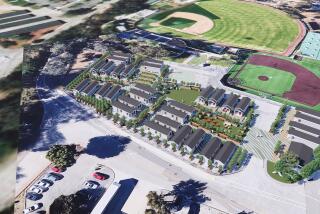Irvine’s ultimate NIMBY fight: A cemetery for veterans deemed an undesirable blight
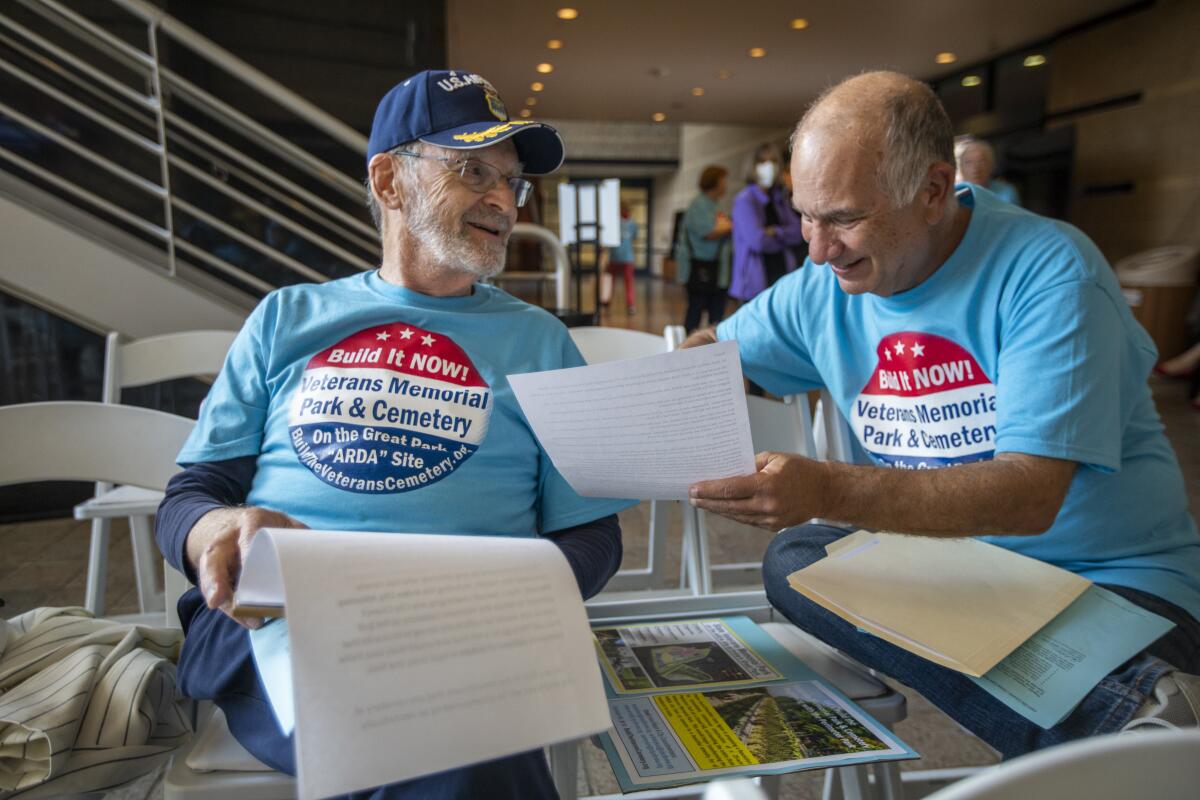
- Share via
In Irvine, every detail is intentional.
From the lush parks to the sparkling pools of its master-planned villages, the city offers a perfect balance of nature and suburban life.
Even the street names in its Great Park neighborhoods, which have popped up over the last decade around the former Marine Corps Air Station El Toro, were developed in consultation with a feng shui master.
But there’s one amenity that Great Park neighbors say will never fit: a veterans cemetery.
A nearly decade-long battle over a military cemetery in the city has pitted veterans, residents and politicians against one another, with every side asserting support for their preferred location and myriad reasons why the plan hasn’t advanced.
The hostile reaction to the cemetery has stunned veterans, who point out the military’s historical role in the area — both with the El Toro base and the nearby Tustin base, both of which closed in the 1990s. To them, the cemetery is a fitting tribute to those who served, and Irvine’s central location would benefit loved ones who want to visit.
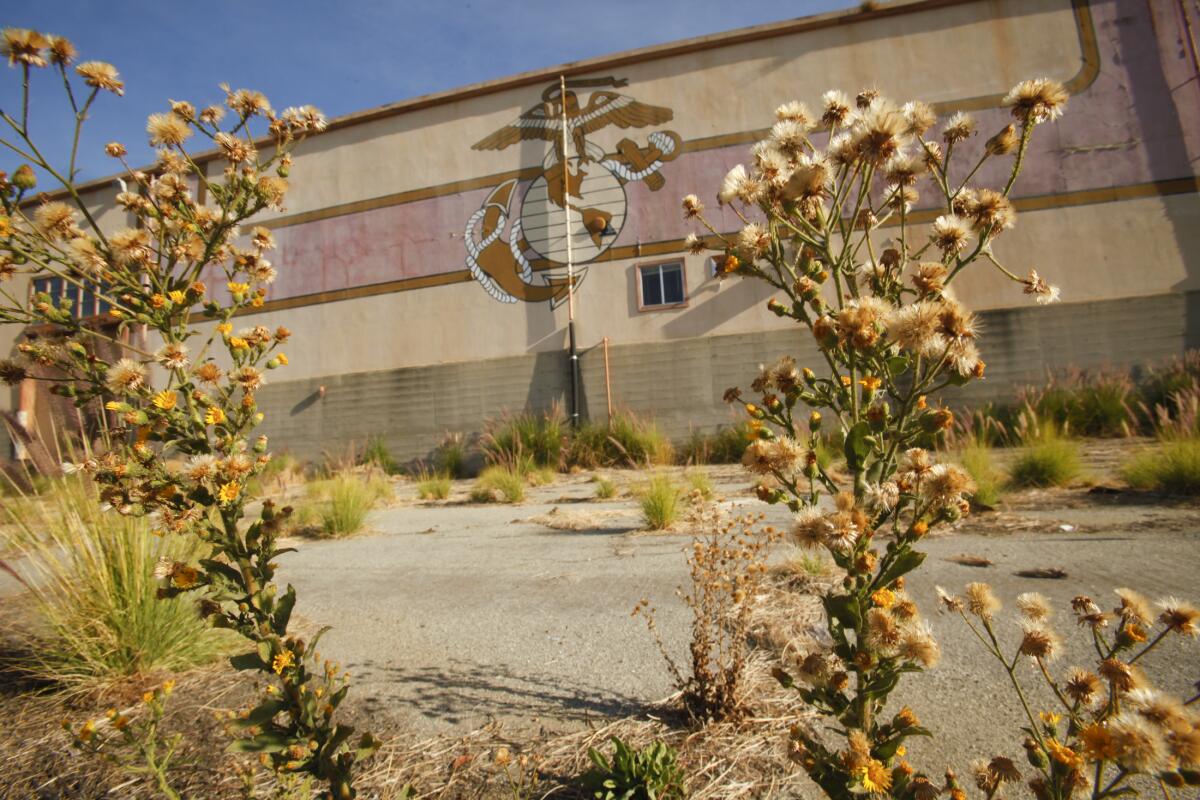
“The opinion on Irvine from veterans ranges from negative to hostile, with profanity thrown in,” Vietnam veteran Bill Cook said. “You’d think Irvine started with an F when I talked to these people.”
But the push to honor veterans proved no match for powerful forces in Irvine: a developer who had other plans, residents who worried about traffic and property values, and a sense that a cemetery simply didn’t fit into the community’s ideas for a place where homes now regularly sell for more than $1 million.
“When you buy a million-dollar home, you don’t want to open up your door and have a cemetery right there,” former Irvine Mayor Christina Shea said. “It just kind of gives a sense of sadness and a continual reminder of death and your own mortality. I wouldn’t buy a home next to a cemetery. I want a golf course, a lake, a park or something like that.”
In a county often criticized for its “not in my backyard” mentality, Irvine has long railed against anything that doesn’t fit with its idea of a master-planned community. When the El Toro base was decommissioned in 1999, residents successfully beat back a proposal to turn the land into an airport, instead opting to transform it into a park with athletic fields, a water park and plenty of open space. In 2018, a plan for a homeless shelter at the Great Park was nixed after vehement opposition.
The controversy over a cemetery has been brewing since at least 2014, yet veterans — thousands of whom settle every year in Orange County after retiring from the military — say they’ve largely been sidelined from discussions. Instead, they’ve been met with consternation from the Great Park’s closest neighbors and hand-wringing from the city’s politicians, they say.
Some are so frustrated by years of delays and fighting over a location that they’ve scouted a site on county land in Anaheim Hills instead. The Orange County Board of Supervisors gave the project a major boost on Tuesday by allocating $20 million from the county’s general fund for site development. The Anaheim City Council this month showed unanimous support for the cemetery.
In the years following the bombing of Pearl Harbor, the U.S. military sought out the land that would eventually become the El Toro base as a place for Marines to train for battle in the Pacific Rim. Tens of thousands of service members and civilians moved through its gates annually, turning the base into a mini-city complete with homes, a church and a school.
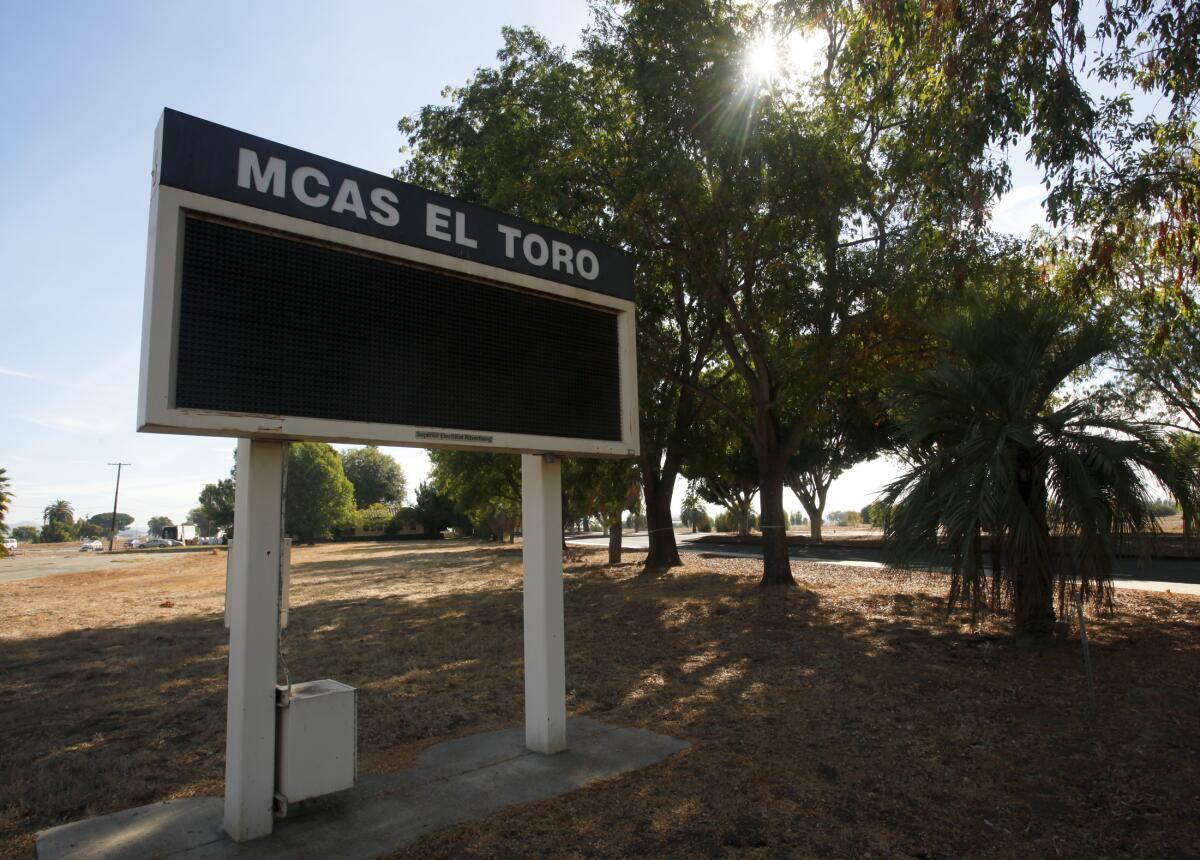
For more than 50 years, El Toro played a critical role in conflicts across the world, including Vietnam and Desert Storm. It’s where men and women leaving for deployment said goodbye to their families — sometimes for the last time.
Victor Cornelio, who fought in Desert Storm, lived at the base for nearly two decades with his family until he retired from the Marine Corps in 1997 and moved to a condominium in Woodbridge. His three children, who were raised at El Toro, miss the base terribly, he said.
“We made so many memories there,” he said. “It was home.”
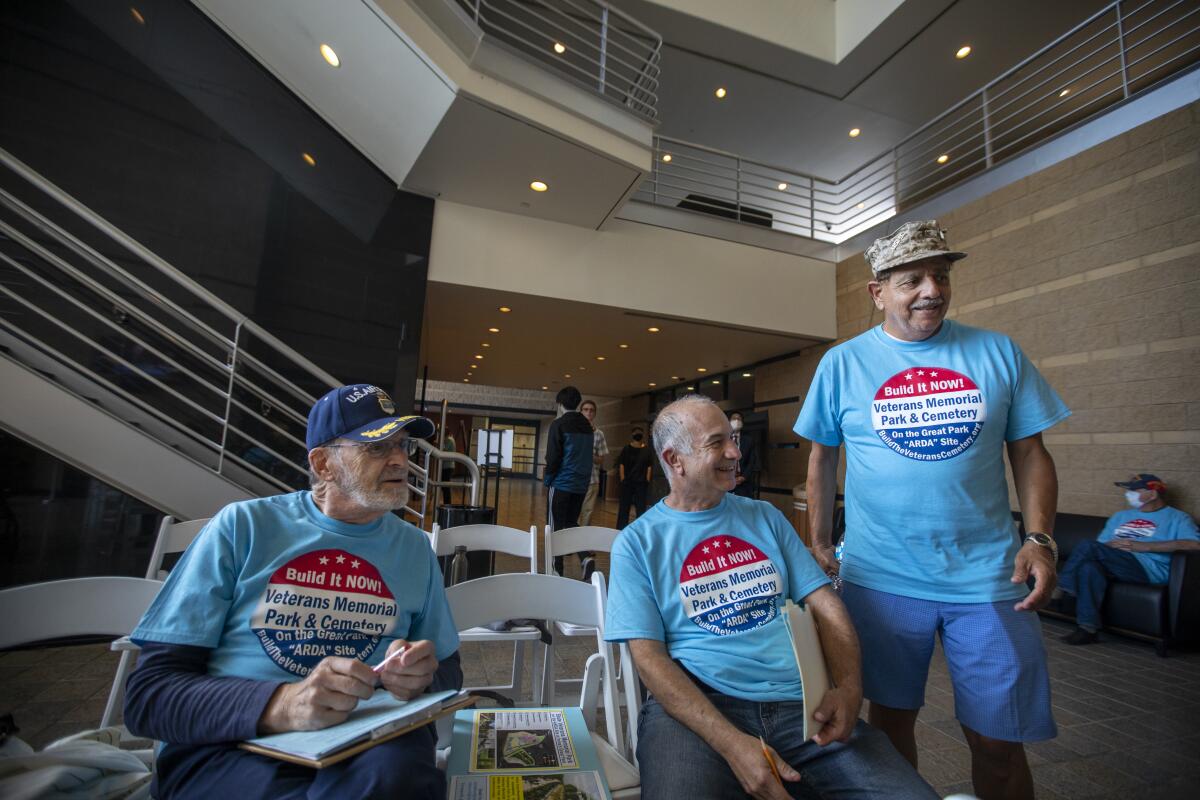
Irvine, which began as miles of prime ranchland with fields of lima beans and citrus groves, has transformed in the last century into one of the fastest-growing cities in California.
At the outset, it was an experiment in master-planned living — a way to preserve lush green space while answering an increasingly urgent demand for housing in the post-World War II population boom, said Ellen Bell, who wrote a book on the history of the city, Orange County’s third-largest.
Neighborhoods that Irvine calls “villages” — each with their own unique architectural style and amenities — give residents the feel of a small town with big-city conveniences.
But it’s also a place where change is not always welcome by longtime residents.
“They see traffic issues that weren’t here 50 years ago, but it’s a city of nearing up to 300,000 people, and it’s going to have growing pains,” Bell said.
By the time residents started arriving in the new Great Park development in 2014, officials had already begun moving forward with plans for a veterans cemetery on a swath of land on the northern edge of the park known as ARDA.
This posed a challenge for the neighborhood’s developer, FivePoint, which recognized that the new homeowners — many of them Chinese — would consider buying property near a cemetery a cultural taboo that prohibits living near the dead.
“We have residents who have a certain cultural belief that is not in favor of living close to a cemetery,” FivePoint Chief Executive Emile Haddad said.
However, a group of Irvine residents, known as Build the Great Park Veterans Cemetery, continued pushing to designate — and zone — ARDA for a veterans cemetery and memorial park. Many of the concerns residents have about the project can be mitigated, according to the group, which includes City Councilman Larry Agran.
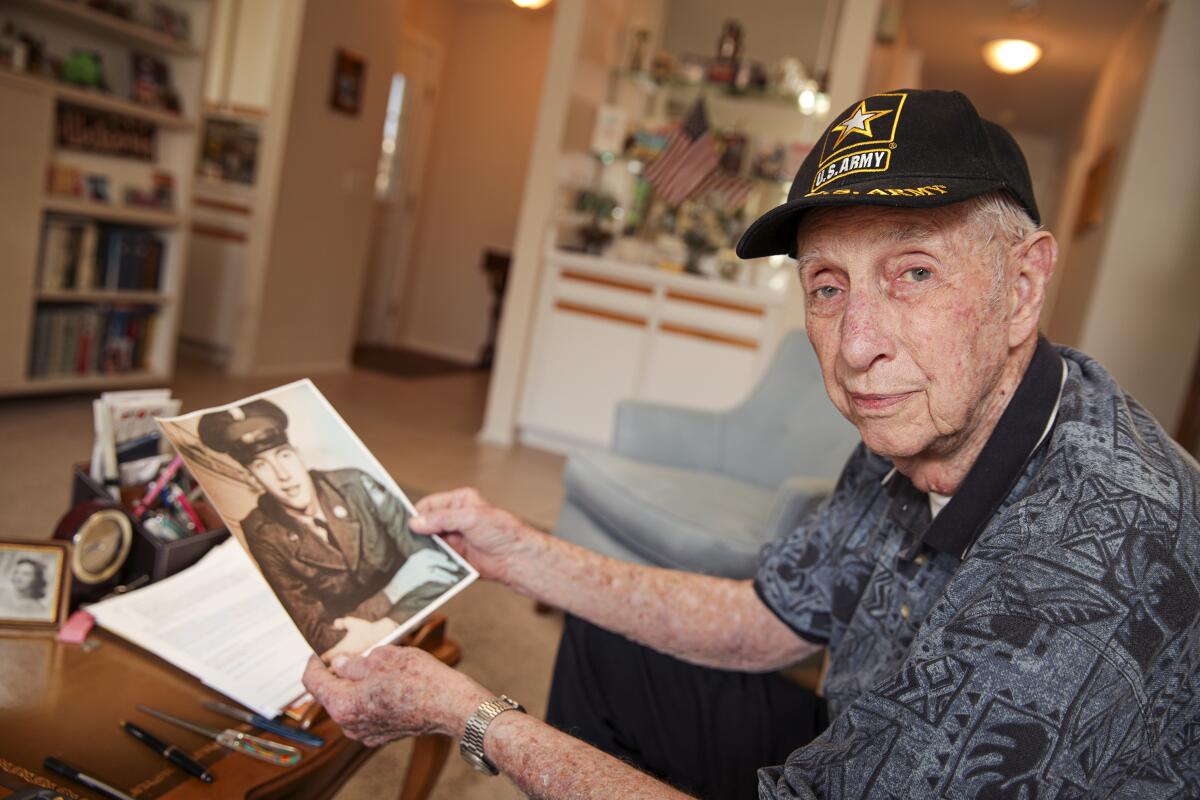
“Veterans deserve the best place to be buried and honored, and that is the ARDA site,” said committee member and Army veteran Ed McNew. “Plain and simple.”
In 2016, Haddad proposed another site for the cemetery — a piece of land called Strawberry Fields that his company owns off Bake Parkway near the El Toro Y interchange. The Build the Great Park Veterans Cemetery group, which is made up of about 25 volunteers, was incensed by the switch to what they said was an inferior location near a busy freeway. As Haddad worked out a deal with city officials to swap the ARDA property for one at Strawberry Fields, the group was mounting an opposition.
The veterans group was motivated by what it saw as an underhanded move between a developer seeking to expand its footprint and City Council members, many of whom had received campaign support from PACs funded in part by developers, including FivePoint.
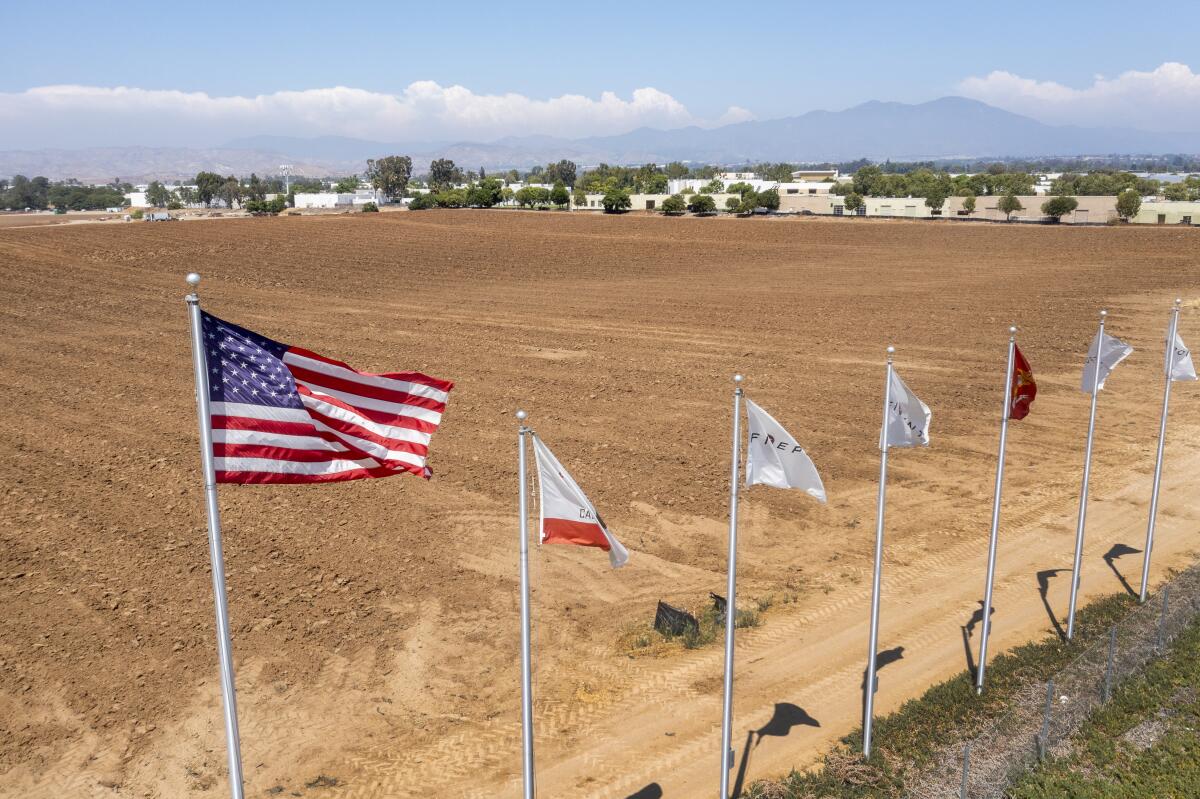
Vietnam veteran Nick Berardino, president of the Veterans Alliance of Orange County, had long been involved in talks with city leaders about placing a cemetery on the former base, but he supported the location switch.
He said the roadblocks with the ARDA site had been evident for years, so when FivePoint proposed the Strawberry Fields site, his organization saw it as the fastest way to get the cemetery approved.
But committee members from the Build the Great Park Veterans Cemetery disagreed and launched a petition to get the issue in front of Irvine voters in 2018.
During the Measure B campaign, FivePoint donated roughly $800,000 to Berardino’s organization to support the land swap. In the end, the referendum was soundly defeated by voters, effectively blocking the deal.
Subscribers get early access to this story
We’re offering L.A. Times subscribers first access to our best journalism. Thank you for your support.
Some longtime Irvine residents saw the donations as evidence that FivePoint and the Veterans Alliance of Orange County were in cahoots. Berardino said that while the developer and his group had different motivations in supporting the location change, he believed it was the best chance they had to build a cemetery in Irvine.
“We were fighting hard for the strawberry field,” Berardino said. “That was our focus. FivePoint’s interest in that particular site aligned with ours, so they were willing to help and we were willing to take their help.”
Other Orange County veterans who live outside the city saw the referendum as a political move orchestrated by Agran to keep FivePoint from getting hold of the ARDA land, not an earnest attempt to build a cemetery.
Disillusioned by continual delays, Berardino’s group began pursuing a site for a cemetery at Gypsum Canyon.
“We knew that this dog wasn’t going to hunt,” Berardino said. “We’d be waiting in Irvine for years. And we can’t waste years. We can’t waste months. I mean, veterans are dying, and particularly Vietnam-era veterans like me, we’re starting to go pretty fast.”
Agran, who has served on the City Council on and off since the late 1970s and helped defeat a proposal to turn the former El Toro base into an airport in the early 2000s, said his intention has always been to build a cemetery on the site where so many veterans served their country.
“To honor the military service of people on the very base where many of them served, there’s almost a romantic element that makes you fall in love with the idea from the start,” he said.
But his efforts have repeatedly fallen flat.
Inside the cavernous Irvine City Council chambers last month, the fight reached a critical moment.
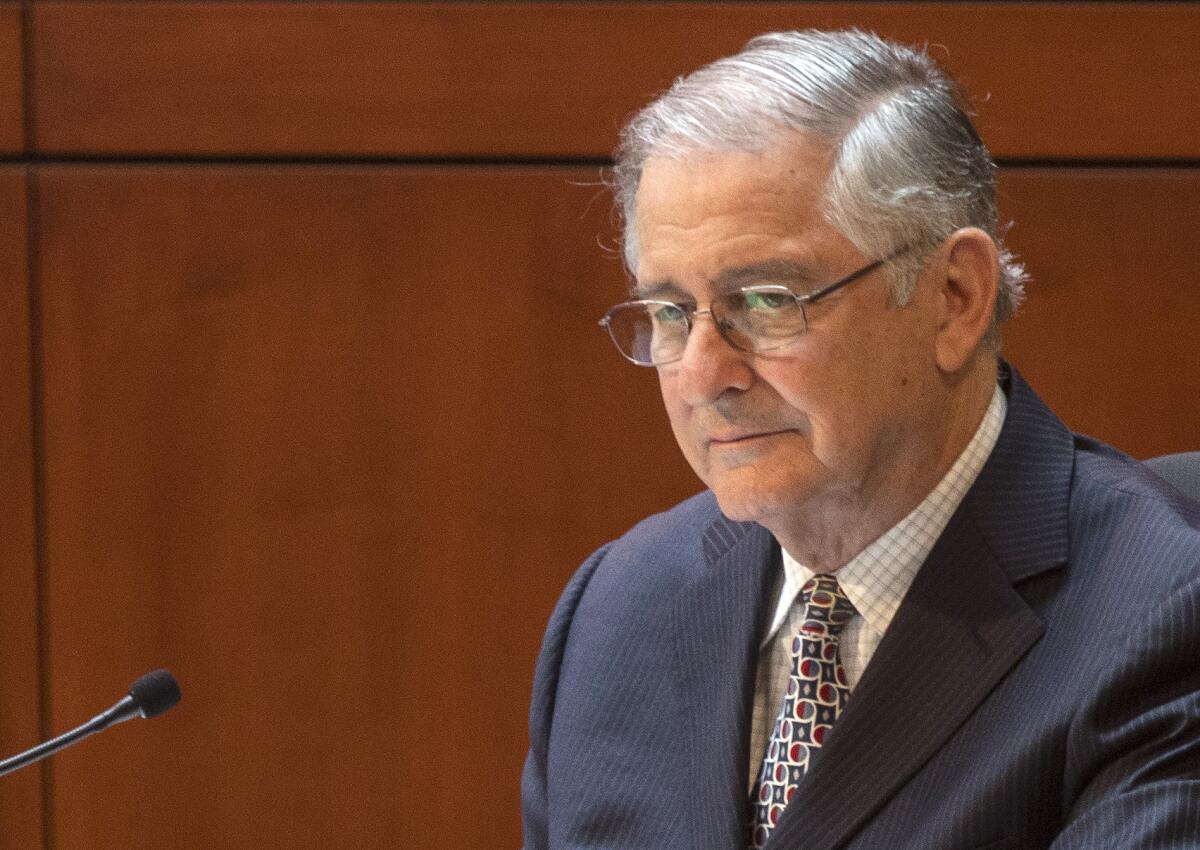
Dozens of Great Park neighborhood residents snagged the first several rows of seats — in direct line of sight of the elected officials, including Agran. They toted posters bearing such messages as “Keep the Great Park great” and “We are not ungrateful dogs in million $ homes.”
They overwhelmed the public-comment period, speaking about cultural concerns, traffic, reduction of property values, the impact on children and, mostly, imparting a feeling of having been misled. Special assessment taxes had been levied on their properties, they pointed out, to pay for development in the Great Park, which unlike association amenities elsewhere in Irvine, is open to the general public.
Many say they purchased homes after the cemetery plan was underway, but they were never told it was a possibility.
“When we bought our homes, we were lied to — simply, truly duped,” Great Park resident Sandra Paperny told the City Council in June. “We were told about a lifestyle fitness gym, a sports complex, retail, boutique hotels, Wild Rivers. Nothing about a cemetery.”
Meanwhile, members of the Build the Great Park Veterans Cemetery wore powder-blue T-shirts emblazoned with the words “Build It Now!”
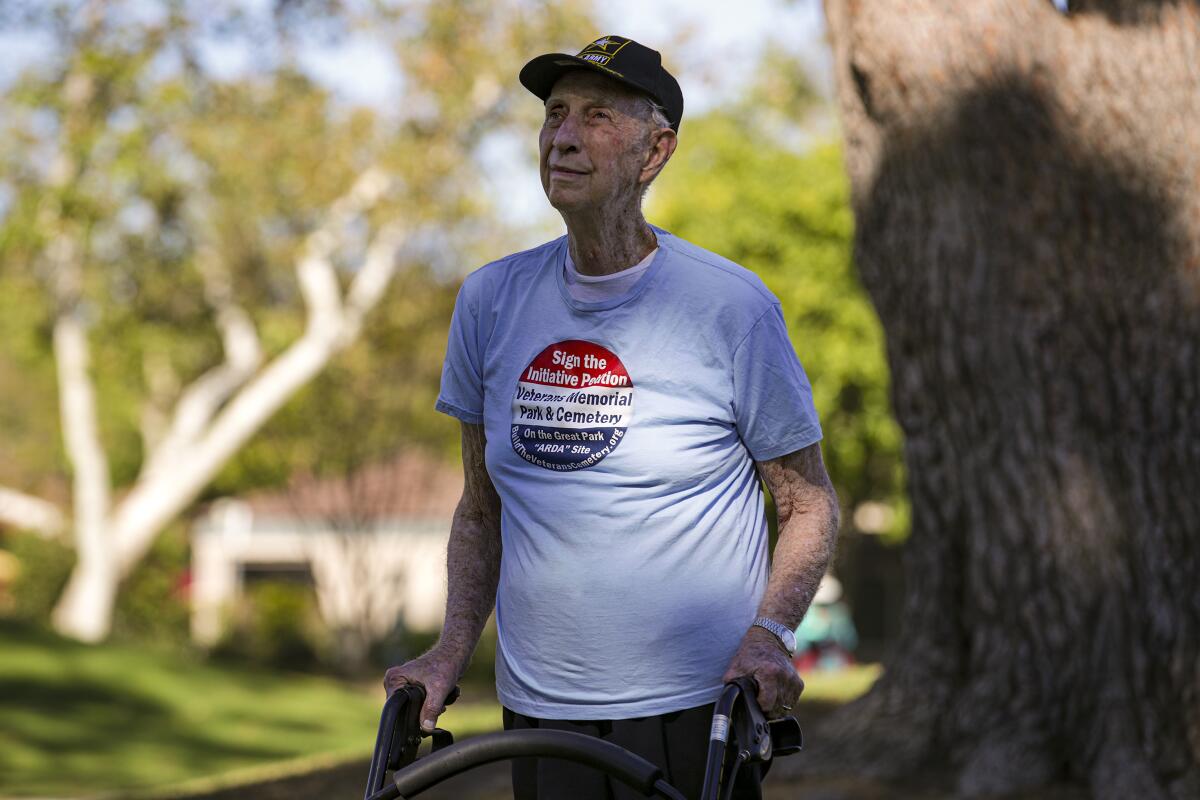
“Our frustration with the City Council is that they don’t respect the residents of Irvine. We’ve lost all faith in them,” McNew said. “But I can tell you this, we’re not giving up.”
As the meeting stretched into its eighth hour, the politicians finally weighed in.
Mayor Farrah Khan had one final compromise. She suggested allocating part of the ARDA site as well as a swath of land that’s slated to be a golf course for the cemetery.
Her motion fell on deaf ears, and the council took no action on the cemetery proposal, all but ensuring it will not be built in Irvine.
“Don’t ever say I didn’t try,” Khan said. “At this point I have no other choice but to allow the veterans to do what they want in Anaheim.”
Cheers from Great Park neighbors filled the room.
More to Read
Sign up for Essential California
The most important California stories and recommendations in your inbox every morning.
You may occasionally receive promotional content from the Los Angeles Times.


